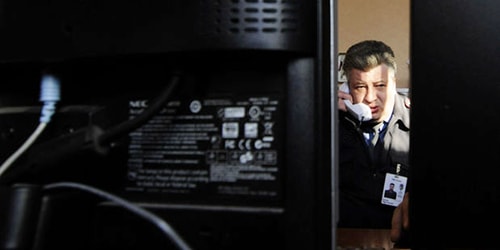Russia and Ukraine on the brink of cyber war
(Baonghean.vn) - Based on a report by the information technology security group Symantec, the Financial Times revealed that an extremely sophisticated virus named "Snake" successfully penetrated the computers in the office of the Ukrainian Prime Minister. About 60 computers were infiltrated since 2012, causing their entire system to be controlled. About a dozen Ukrainian embassies also suffered the same fate.
Sensitive diplomatic information has fallen into the hands of spies, amid tense relations between Russia and Ukraine. Who is behind this virus? Many clues point to Moscow: for example, the source code contains Russian keywords and the Russian time zone. Of course, that alone is not enough to confirm anything.
 |
| A Russian police officer in Veliki Norgorod (AFP/Mikhail Mordasov) |
However, this virus, which appeared in 2006, has only spread and attacked the Ukrainian system particularly strongly since 2013. Of the 56 cases discovered in the world since 2010, 44 cases were recorded last year, according to a report by the British corporation BAE systems. Half of them targeted Ukraine, with the intensity increasing along with the political crisis between Ukraine and Russia.
This is not surprising because since the beginning of the Ukrainian crisis, hackers from both countries have openly confronted each other on the digital battlefield. The most common weapons: denial-of-service attacks or website request saturation. On March 16, the day of the Crimean secession referendum, the website created by the separatists to monitor the vote was blocked. Earlier, NATO's website was attacked and disabled for several hours by a Ukrainian hacker group called "CyberBerkout" - a parody of "Berkout", the name of the police mobilized to quell the riots in Kiev. However, unlike the Snake virus, these types of attacks are only a formality, showing off but do not leave any consequences in terms of system operations, said cybersecurity expert Nicolas Caproni.
Cyber warfare is a war of propaganda and information disruption. For example, in the midst of the Maidan uprising (February), Russian websites claimed that the hacker group Anonymous had hacked into the email of opposition leader Vitali Klitshko, suggesting that the West was behind the financial support for the uprising. However, no evidence was provided and it is likely that this was a Russian smokescreen. Similarly, after the MH17 crash, the open Wikipedia page dedicated to this event was edited by VGTRK, a Russian government media group, claiming that the plane was shot down by the Ukrainian army. The purpose of cyber warfare is to dominate the electronic information space, thereby imposing one's opinions, influencing political views and public opinion, calling for support at home and abroad...
However, it is difficult to determine whether the masterminds of these attacks are independent hacker groups or government-affiliated organizations. Of course, they have never admitted it, but according to CNRS cybersecurity expert Daniel Ventre, "It is very likely that the Kremlin is behind these attacks, and so is Ukraine." The CyberBerkout hacker group is believed to be directly or indirectly controlled by the Kremlin.
A cyber war against Ukraine initiated by Russia is entirely possible when in 2007, Estonia, which was in a tense relationship with Russia, was also attacked in cyberspace, causing a part of the country to be paralyzed. So if the Russia-Ukraine crisis escalates, it is very possible that a digital war will be accompanied by a real war in the literal sense of the word. (News from Le Monde 12/08)
Ganoderma lucidum
